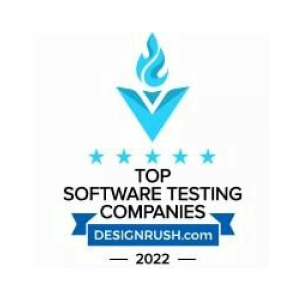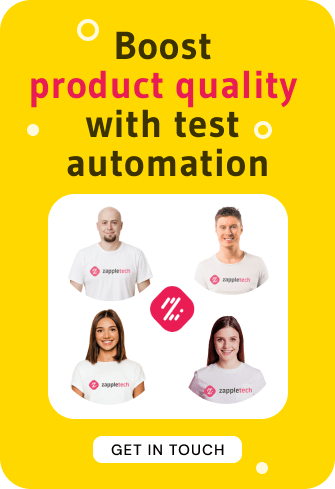QA Automation Testing Services
When Do You Need Automation Testing Services?
The Benefits of Automation QA Services
What Our Customers Say
Types of Automation Testing Services ZappleTech Performs
To make sure your software works correctly, our engineers can:
- Join at any stage of software development.
- Develop, run, and keep functional tests at the right level (API and UI automated tests)
To make sure new features keep up with other parts of the software, ZappleTech uses automated regression testing.
ZappleTech’s test automation engineers validate the following software integrations to ensure smooth end-to-end workflows and business data consistency:
- Internal (between software components and modules)
- External (between software and third-party applications it’s integrated with)
To ensure stability and high performance, ZappleTech test automation team performs:
- Stability testing
- Scalability testing
- Load testing
- Stress testing
ZappleTech engineers can automate the following cybersecurity checks to make sure your software doesn’t have common security vulnerabilities and meets relevant regulatory standards:
- Vulnerability scanning
- Code analysis
- Compliance testing
Our engineers test software compatibility with:
- Required operating systems and devices
- Network conditions
- The different browsers and their versions
Our QA Automation Testing Services
Industries We Work With
Our Expertise

Our Automation QA Services Flexibility
ZappleTech Automation Testing Services Strategy
Test Automation Services Process
Our Test Automation Toolkit





Our Automation QA Services Options
Our automation testing consultants:
- Analysis and strategy
Strategic advice - Tailored automation solutions
- Tool selection and integration
Our QA engineers engage in:
- Strategic planning
- Infrastructure management
- Execution and maintenance
- Analysis and reporting
Our test automation team:
- Enhances test script maintenance
- Develops resilient automated tests
- Elevates test data quality
- Seamlessly integrates with CI/CD
Start Cooperation Now!

Revolutionizing QA Processes: The Role of QA Automation Testing Services
Quality assurance (QA) stands as a critical pillar within software development, ensuring that products meet stringent standards of functionality and reliability. As software systems become increasingly intricate, the role of services for automation becomes even more pronounced. Testing services for automation, including automation QA and test automation services, have emerged as indispensable tools for QA teams grappling with the complexities of modern software architecture.
The escalating complexity of software systems poses formidable challenges for QA teams. Navigating through intricate codebases, diverse environments, and evolving user expectations demands innovative solutions. This is where automation services become paramount. Service testing automation, facilitated by test automation service providers, streamlines QA processes by harnessing the power of automation.
Testing services for automation offer a multifaceted approach to tackling QA challenges. From accelerating test cycles to bolstering test coverage, these services empower QA teams to transcend the constraints of manual testing. By automating repetitive tasks and optimizing resource allocation, automation QA services drive efficiency and scalability in software testing endeavors.
In essence, testing services are the linchpin of modern QA methodologies, driving agility, reliability, and innovation in software development. As software systems continue to evolve in complexity, their role becomes increasingly indispensable in ensuring product quality and accelerating time to market.
Understanding QA Automation Testing Services
Testing services, such as QA automation services and test automation services, are indispensable assets in modern software engineering. These solutions streamline the testing process, optimizing efficiency and minimizing manual effort.
In today’s software development landscape, organizations increasingly rely on Testing services for automation to meet the demands of complex software systems. These services aim to accelerate time-to-market while maintaining high standards of quality. By leveraging automation tools and frameworks, teams can execute tests with precision and repeatability, reducing the risk of human error.
Automation services encompass various testing needs, spanning regression testing, functional testing, performance testing, and beyond. Regression testing, a cornerstone of automation testing services, verifies the integrity of existing functionalities after code changes, safeguarding against unintended consequences. Functional testing ensures that the software meets user expectations and business objectives, while performance testing evaluates the system’s responsiveness and scalability under varying load conditions.
Organizations prioritize expertise and reliability when selecting a test automation service provider to meet their testing requirements. These providers offer services for automation, from tool selection and implementation to test script development and execution. Organizations can enhance the effectiveness of their QA processes by partnering with a reputable provider of test automation services.
These services are pivotal in modern software development, enabling organizations to achieve higher efficiency, accuracy, and agility levels. Embracing service testing automation empowers teams to deliver high-quality software products that meet the demands of today’s dynamic market.
The Benefits of Automation Testing Services
These services offer many benefits that significantly enhance the quality and efficiency of software development processes. One of the primary advantages is the improvement in test coverage. Through service testing automation, organizations can execute a comprehensive suite of tests across various scenarios, ensuring thorough validation of software functionality. QA automation testing services play a crucial role in this aspect, enabling the automation of repetitive test cases and expanding test coverage beyond what manual testing can achieve.
Moreover, automation services facilitate faster feedback cycles, a critical factor in agile development methodologies.
By automating test execution and result analysis, organizations can promptly identify defects and issues, allowing for timely corrective actions. This agility is particularly valuable in fast-paced development environments where rapid iterations and continuous integration are the norm. Automation QA services enable teams to maintain pace with the development velocity without compromising quality.
Furthermore, testing services for automation contribute to significant cost savings for organizations. While initial investments may be required to set up automation frameworks and tools, the long-term benefits outweigh the costs. Testing services for automation optimize resource utilization and increase overall productivity by reducing the need for manual intervention and minimizing human error. Test automation service providers specialize in implementing cost-effective automation solutions tailored to organizations’ specific needs and budget constraints.
To illustrate the tangible benefits of its services, let’s consider a case study of a software company that adopted automation testing to enhance its product quality and efficiency. Before implementing automation, the company relied heavily on manual testing, leading to prolonged testing cycles and frequent regressions. They implemented a robust automation framework tailored to their software stack by partnering with a reputable test automation service provider. The results were remarkable – they experienced a significant reduction in testing time, allowing for faster release cycles and quicker time-to-market. Moreover, the improvement in test coverage led to a substantial decrease in post-release defects, resulting in higher customer satisfaction and retention rates.
In conclusion, automation services offer myriad advantages that revolutionize software development processes. The benefits are undeniable, from improved test coverage to faster feedback cycles and substantial cost savings. Organizations can use these services to improve their quality control practices, create better software products, and gain a competitive advantage in the market.
Critical Components of Automation Testing Services
The foundation of effective automation testing services lies in a well-structured automation testing framework comprising several essential components. These components, including test planning, test script development, execution, and reporting, form the backbone of the automation process.
- Test Planning: Test planning is the initial phase of testing, during which QA teams outline their testing objectives, scope, and strategy. In service testing automation, meticulous test planning ensures comprehensive coverage of test scenarios and aligns testing efforts with project requirements. QA automation testing services assist in creating detailed test plans tailored to the project’s specific needs, considering factors such as target platforms, test environment setup, and resource allocation.
- Test Script Development: Test script development involves creating automated test scripts that simulate user interactions and validate software functionality. Testing services for automation leverage various scripting languages and frameworks to develop robust test scripts to execute complex test scenarios. Automation QA services are pivotal in crafting efficient and maintainable test scripts, ensuring scalability and reusability across different testing phases.
- Execution: Execution is the phase where automated test scripts are run against the software under test. Automation services facilitate the seamless execution of test scripts across multiple environments and configurations. Test automation service providers offer specialized tools and technologies to orchestrate test execution, manage test suites, and monitor test results in real time. This ensures consistent and reliable execution of test cases throughout the testing lifecycle.
- Reporting: Reporting is crucial for gaining insights into test results and identifying areas for improvement. Service generates comprehensive reports summarizing test execution outcomes, including pass/fail statuses, error logs, and performance metrics. QA automation services enable customizable reporting formats tailored to stakeholders’ requirements, facilitating clear communication and decision-making.
Selecting the right tools and technologies is paramount in ensuring the success of services for automation. When choosing automation tools and frameworks, organizations must consider project requirements, technical constraints, and budgetary considerations. Test automation service providers offer diverse tools catering to different testing needs, from open-source frameworks like Selenium and Appium to commercial solutions like HP Unified Functional Testing (UFT) and Tricentis Tosca. Testing services for automation evaluate these tools based on platform compatibility, scripting language support, integration capabilities, and community support. By selecting the right tools and technologies, organizations can maximize the effectiveness of their automation testing efforts and achieve superior test coverage, reliability, and efficiency in their software development endeavors.
Integration with DevOps Practices
Testing services for automation play a pivotal role in seamlessly adopting DevOps practices as a linchpin that aligns testing efforts with agility, efficiency, and quality goals. Organizations can bridge the gap between development and operations by incorporating testing services into DevOps workflows, fostering collaboration and synergy across the software delivery lifecycle.
Key aspects of how automation testing services integrate with DevOps practices include
- Continuous Integration/Continuous Deployment (CI/CD) Pipelines: They are seamlessly integrated into CI/CD pipelines, enabling organizations to automate the build, test, and deployment processes. Within CI/CD pipelines, QA automation testing services facilitate the execution of automated tests at each pipeline stage, ensuring the rapid identification of defects and regressions. This continuous feedback loop fosters early bug detection and resolution, minimizing the risk of introducing defects into production environments.
- Automated Deployment Verification: Testing services validate the integrity of software deployments in CI/CD pipelines, ensuring that each release meets the predefined quality standards before being promoted to production. Through automated deployment verification tests, organizations can mitigate the risk of deploying faulty or unstable code, thereby enhancing the reliability and stability of production environments. Automation QA services are crucial in designing and executing these verification tests, ensuring the seamless code transition from development to production.
- Infrastructure as Code (IaC) Testing: Automation testing services extend beyond application testing to encompass infrastructure testing in DevOps environments. With the rise of Infrastructure as Code (IaC) practices, organizations rely on automation services to validate the configuration and provisioning of infrastructure components. Test automation service providers offer specialized tools and frameworks for testing infrastructure changes, ensuring consistency, reliability, and compliance with infrastructure policies and standards.
- Continuous Monitoring and Feedback: Testing services provide continuous monitoring and feedback mechanisms that enable organizations to track critical performance and quality indicators throughout the software delivery lifecycle. By leveraging automated monitoring tools and dashboards, QA teams can gain real-time insights into test execution results, performance trends, and production metrics. This visibility empowers organizations to make data-driven decisions, identify areas for improvement, and optimize DevOps processes iteratively.
In summary, automation services catalyze DevOps transformation, enabling organizations to achieve higher agility, efficiency, and quality in their software delivery practices. By seamlessly integrating automation
testing into CI/CD pipelines, organizations can accelerate time-to-market, improve deployment reliability, and enhance overall product quality. Automation QA services drive continuous improvement and innovation within DevOps environments, ensuring organizations remain competitive in today’s dynamic market landscape.
Challenges and Best Practices
Implementing automation services presents organizations with common challenges that require careful consideration and proactive management. These challenges, ranging from tool selection to test data management, can impact the effectiveness and efficiency of automation testing initiatives.
Common Challenges
- Tool Selection: Choosing the right automation testing tools and frameworks can be daunting. With many options available, organizations may need help identifying tools that align with their specific testing requirements and technical constraints. Furthermore, compatibility issues with existing systems and infrastructure can complicate the tool selection.
- Maintenance Overhead: Automating test suites can impose a significant overhead on QA teams. As software systems evolve and undergo frequent updates, test scripts may require constant modifications to adapt to changes in functionality and user interfaces. This maintenance overhead can consume valuable time and resources, detracting from the efficiency gains promised by testing services.
- Test Data Management: Effective test data management is essential for automation services to generate meaningful test scenarios and validate software functionality accurately. However, organizations often encounter challenges creating and managing test data sets that adequately represent real-world usage scenarios. Additionally, ensuring the integrity and confidentiality of test data across different testing environments can pose security and compliance risks.
Best Practices and Strategies
- Proper Test Case Design: Embracing a systematic strategy for crafting test cases is crucial for optimizing the efficiency of automated testing. Companies should prioritize test cases, concentrating on significant scenarios encompassing essential functionalities and user pathways. Additionally, designing test cases with modularity and reusability in mind facilitates more manageable maintenance and scalability of test suites.
- Effective Collaboration Between Development and QA Teams: Effective collaboration between development and QA teams is essential for overcoming challenges associated with testing services for automation. Close coordination ensures alignment of testing efforts with development goals and requirements, enabling early detection and resolution of issues. Leveraging communication tools and agile methodologies fosters a culture of collaboration and shared responsibility.
- Regular Maintenance of Test Scripts: Proactive maintenance of test scripts is vital for mitigating the maintenance overhead associated with testing services. Organizations should implement version control systems to track changes to test scripts and facilitate collaboration among team members. Additionally, conducting regular code reviews and refactoring test scripts helps identify and address potential issues before they escalate.
By implementing these best practices and strategies, organizations can overcome the challenges inherent in automation services and maximize the value derived from their automation initiatives. Through proper test case design, effective collaboration, and proactive maintenance, organizations can leverage automation services to enhance the quality, efficiency, and reliability of their software development processes.
Selecting the Right Automation Testing Service Provider
Selecting the right automation testing service provider is a crucial decision that can significantly impact the success of your automation initiatives. With many available options, organizations must carefully evaluate and assess potential service providers based on various criteria to ensure alignment with their specific testing requirements and objectives.
Guidance on Evaluating and Selecting a Suitable Automation Testing Service Provider
- Expertise and Experience: Look for a test automation service provider with a proven track record of expertise and experience in delivering services for automation. Assess the provider’s portfolio of projects, client testimonials, and case studies to gauge their proficiency in addressing diverse testing challenges and delivering successful outcomes.
- Tool Proficiency: Evaluate the provider’s proficiency in utilizing automation testing tools and frameworks relevant to your project requirements. A competent test automation service provider should demonstrate expertise in a wide range of automation tools, such as Selenium, Appium, or TestComplete, and possess the capability to leverage them effectively to address your specific testing needs.
- Scalability: Consider the scalability of the automation services the provider offers. Assess their ability to scale resources and infrastructure to accommodate changes in project scope, testing requirements, and workload fluctuations. A flexible and scalable service provider can adapt to evolving business needs and ensure seamless integration of automation testing into your software development processes.
- Cost: While cost is essential, it should not be the sole determinant in selecting an automation testing service provider. Evaluate the provider’s pricing model, including upfront costs, ongoing maintenance fees, and additional specialized services or support charges. Choose a provider that offers transparent pricing and delivers value commensurate with the investment.
Important Factors to Consider
- Expertise and Experience: Evaluate the provider’s expertise and experience in delivering testing services across various industries and domains. Look for certifications, accreditations, and industry recognitions that validate their competency and credibility in automation testing.
- Tool Proficiency: Assess the provider’s proficiency in utilizing automation testing tools and frameworks relevant to your project requirements. Consider tool compatibility, scripting language support, integration capabilities, and vendor support services.
- Scalability: Determine the provider’s ability to scale resources and infrastructure to accommodate changes in project scope, testing requirements, and workload fluctuations. Evaluate their capacity to handle concurrent projects and effectively adapt to dynamic business needs.
- Cost-Effectiveness: Compare the costs associated with different automation testing service providers and assess each value proposition. Consider upfront costs, ongoing maintenance fees, licensing fees for automation tools, and additional specialized services or support charges.
- Quality Assurance Processes: Evaluate the provider’s quality assurance processes and methodologies to ensure adherence to industry best practices and standards. Look for certifications such as ISO 9001 or CMMI Level accreditation, demonstrating a commitment to quality and continuous improvement.
By carefully evaluating these factors and conducting thorough due diligence, organizations can select a suitable automation testing service provider that aligns with their specific testing requirements, objectives, and budget constraints. A strategic partnership with the right provider can empower organizations to unlock the full potential of automation testing and drive efficiency, reliability, and innovation in their software development endeavors.
10 Best QA Testing Tools and Software in 2024
Selenium | Selenium remains a top choice for automated web application testing. Its robust features and comprehensive browser support make it a favorite among QA professionals. With its seamless integration into testing services, Selenium facilitates efficient service automation and ensures comprehensive QA automation testing services. |
Appium | Appium continues to dominate the mobile testing landscape with its cross-platform capabilities. It allows QA teams to conduct automated testing for iOS and Android apps. Its integration with automation services enables QA automation testing services, ensuring thorough automation testing across different platforms. |
Postman | Postman is a robust API testing tool that streamlines the process of testing APIs. It allows for easy design, automation, and documentation of API requests. Its integration into automated testing procedures enhances efficiency, enabling smooth automation of API testing tasks. |
TestRail | TestRail is an extensive test management tool designed to assist QA teams in arranging test cases, monitoring test outcomes, and generating comprehensive reports to facilitate efficient test management. Its compatibility with automation tools streamlines the automation testing process, guaranteeing efficient execution. |
Jenkins | Jenkins continues to be a favored option for setting up continuous integration and continuous delivery (CI/CD) pipelines. It enables QA teams to automate building, testing, and deploying processes. Serving as a key element in testing automation, Jenkins manages the execution of automated testing tasks, promoting smooth integration and deployment of testing automation. |
Jira | With its robust issue-tracking and project management capabilities, Jira remains a favorite tool for agile QA teams to plan, track, and prioritize testing tasks. Its integration with automation services enhances collaboration and visibility, ensuring efficient management of testing services within agile workflows. |
LoadRunner | LoadRunner by Micro Focus is a premier performance testing solution that empowers QA teams to replicate real-world user loads and evaluate application performance across diverse scenarios. Its integration into testing frameworks enhances the accuracy and reliability of performance testing within services for automation. |
Katalon Studio | Katalon Studio is a comprehensive test automation platform that encompasses various features for testing web, API, mobile, and desktop applications, earning it favor among QA teams. Its integration into testing frameworks establishes a strong foundation for automated testing across various application environments. |
Cypress | Cypress is gaining popularity for its fast, reliable, easy-to-use test automation framework for web applications. It offers time travel, real-time reloads, and automatic waiting features. Its integration with automation services streamlines the web application testing process, ensuring efficient and reliable automation services. |
Tricentis Tosca | Tricentis Tosca is an enterprise-level test automation platform delivering comprehensive testing solutions for various applications, from web and mobile to APIs and packaged software. With its extensive features and capabilities, Tricentis Tosca enables smooth automation testing across various application environments, guaranteeing thorough test automation services. |
Future Trends in QA Automation Testing
As technology evolves, automation testing is poised to embrace several emerging trends that promise to revolutionize the landscape of QA processes. Some of the key future trends in automation testing include:
- AI-Driven Testing: AI-driven testing is gaining traction as organizations seek to harness the power of artificial intelligence and machine learning to enhance testing efficiency and accuracy. AI algorithms can analyze vast amounts of test data, identify patterns, and predict potential defects, enabling proactive defect prevention and faster test execution. This trend has the potential to significantly augment the capabilities of automation testing services and improve overall testing outcomes.
- Test Automation for Non-Functional Requirements: While traditional automation testing primarily focuses on functional testing, there is a growing emphasis on automating non-functional testing aspects such as performance, security, and usability. Test services for automation increasingly incorporate tools and frameworks that facilitate automated testing of non-functional requirements, ensuring that software products meet functional specifications and deliver optimal performance, reliability, and user experience.
- Test Automation in Emerging Technologies: With the proliferation of emerging technologies like the Internet of Things (IoT) and Artificial Intelligence (AI), testing services are adapting to accommodate testing needs in these domains. IoT testing, for example, requires specialized tools and methodologies to validate the interoperability, reliability, and security of interconnected devices and systems. Similarly, AI testing involves testing AI models, algorithms, and decision-making processes to ensure accuracy, robustness, and ethical compliance.
Closing Thoughts
In the fast-paced and ever-evolving landscape of modern software development, embracing testing services is no longer a choice but a necessity. The transformative impact of services for automation QA processes cannot be overstated. By harnessing the power of automation, organizations can achieve unprecedented levels of efficiency, accuracy, and agility in their software testing endeavors.
Testing services, including QA automation testing services, offer a holistic approach to software testing that transcends the limitations of manual testing. Organizations can accelerate test cycles, increase test coverage, and enhance overall product quality with automation. Automation QA services enable teams to focus on strategic aspects of testing while relegating repetitive tasks to automated workflows, optimizing resource allocation, and maximizing productivity.
As organizations strive to remain competitive in today’s dynamic market landscape, exploring further resources and considering integrating automation services into their QA strategies is imperative. Test automation service providers offer a wealth of expertise, tools, and resources to support organizations in their automation journey. Organizations can leverage industry best practices, cutting-edge technologies, and proven methodologies to drive innovation and achieve business success by partnering with a reputable test provider.
In conclusion, automation services represent a paradigm shift in QA practices, empowering organizations to overcome testing challenges, accelerate time-to-market, and deliver high-quality software products that meet the demands of today’s digital age. Embracing automation services is about optimizing testing processes and embracing a culture of innovation, collaboration, and continuous improvement. It is about setting a new standard of excellence in software development and positioning organizations for success in the rapidly evolving digital landscape.
Frequently Asked Questions:
What are automation testing services?
This is the process of creating launch, control, and analysis results of digital product testing scenarios. This method is used everywhere to accelerate project work and ensure a 100% pass rate, the validity of results, and coverage of all testing tasks regardless of code size and overall project scope. Advanced tools such as Selenium, TestCafe, Ranorex, and more advanced NLP complexes or systems are used for its implementation.
This QA model also provides developers with relevant information about the current state of the product, allowing them to fix critical bugs in time and preventing them from reaching the final release.
What tasks are solved by automation testing services?
Using algorithms in scenarios, the digital solution is examined for bugs in code, modules, integration protocols, functionality, interface, and more. This makes it possible to parallelize tests by testing several target platforms simultaneously and analyzing the results. This significantly speeds up the process of working on the project and increases the chances of detecting problems early in development.
For most current projects, test environments are deployed in the cloud, reducing resource costs and speeding up the process. By leveraging server capacity, maximum productivity is achieved, allowing the project to be completed just in time.
How much do automation testing services cost?
The cost of projects is calculated based on the following factors:
- the scope of the project;
- number of tasks;
- the size of the team;
- skill level of each specialist;
- geolocation of the contractor;
- types of tests;
- the comprehensiveness of services.
This is the reason why it is almost impossible to calculate the price of the work in advance, especially if the project is developed using Agile methodology, where the code and app components can change at any time at any stage.
The median cost of a small project can be up to $20,000, a medium project up to $50,000, and a large-scale project over $100,000. It is considered that the price of testing is 20% of the total project cost, i.e., the cost of hiring a team, technical stack, and licensing.
In which projects can automation testing services be used?
In all of them without exception. The larger the project, the more checks need to be automated to achieve 100% task coverage. Creating scripts solves the most complex and routine processes. This allows the QA staff to focus 90% of their time on validating the results and taking action to eliminate the detected errors.
Whether it’s a web app, website, mobile, or desktop software, you need to automate as many tests as possible to achieve the highest quality results. This applies to functionality, interface, performance, or code. With algorithms in scripts, you can cover 100% of the actual tasks, reducing the resource costs of maintaining a large staff of QA masters.
What are the types of automation testing services?
There are such common types:
- Functional.
- Unit
- Integration.
- Smoke.
- Non-functional.
- Security.
- Regression.
- Keyword-driven.
- User’s.
- Performance.
- Acceptance.
- GUI.
All of them can and should be automated to ensure the best possible result. Each test is performed manually before automation, which minimizes the chances of errors within the scripting code.
Using automated algorithms reduces resource consumption, allows parallelization of tests for different platforms, and thus speeds up the process. Using automation, QA experts can focus their efforts on solving critical problems while analyzing the results of routine tests.
Why should I choose Zapple Tech for automation testing services?
Did you know that some IT projects fail at release due to poor optimization or bugs? We strive to save our clients from such an unenviable fate by:
- maximum involvement in the project;
- extensive experience in the QA industry;
- personal responsibility of each team member;
- skills and knowledge of Agile, DevOps, and TestDevOps development methods;
- use of advanced tools, including advanced NLP.
Our team consists of 30 test automation experts, where more than 60% are Seniors. In 7 years on the market, we have successfully completed more than 40 projects for clients worldwide. We have faced different technical stacks, short deadlines, and demanding customers. And despite all the challenges, we continue to work, providing your products with the best QA in the world.








